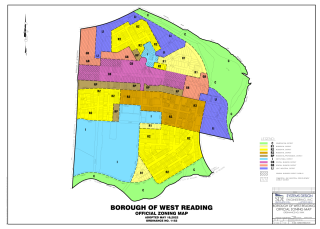Zoning Ordinance

The Zoning Ordinance regulates zoning and is intended to promote the health, safety and general welfare of the public and to implement controlled development of the Borough. It is administered by the borough Zoning Officer whose mission is to promote livable communities which enhance the quality of life for the present and the future.
The Zoning Ordinance is subject to periodic revisions upon action by Borough Council. Should you have questions regarding the Zoning Ordinance, please contact the Zoning Officer whose office is located in the Code Department at 610-374-8273, extension 223.
A Zoning Application must be submitted and approved prior to occupancy being permitted to any commercial space or for any portions to be used above or below the commercial space. If a zoning application is denied by the Zoning Officer, the applicant may request a hearing before the West Reading Zoning Hearing Board.
The Zoning Ordinance of the Borough of West Reading is unique to the Borough of West Reading. The Zoning Ordinance is amended from time to time and most recently in 2022.
Overview
The following is an overview of the process that you will encounter when you are contemplating seeking approval of zoning, a special exception or variance from the Borough of West Reading.
Zoning Glossary
Easement: A right or interest in property owned by another for a specific and limited purpose. Examples: access easement, utility easement, construction easement, etc. Easements may be for public or private purposes.
Impervious Surface: Any land area covered by buildings or paved with a hard surface such that water cannot seep through the surface into the ground.
Special Exception: Uses, which by their nature, can have an undue impact upon or can be incompatible with other land uses and therefore need a site-specific review. After review, such uses may be allowed to locate within given designated zoning districts if appropriate and only under special controls, limitations, and regulations. A special exception is subject to public hearings by the Zoning Hearing Board. The Board may impose reasonable conditions to assure, for example, compatibility and safety.
Conditional Use: The zoning ordinance identifies certain land uses which do not precisely fit into existing zones, but may be allowed upon approval of a conditional use permit (CUP). A conditional use permit allows the Borough to consider uses which may be essential or desirable, but which are not allowed as a matter of right within a zoning district, through a public hearing process. A conditional use permit can provide flexibility within a zoning ordinance. Another traditional purpose of the conditional use permit is to enable a municipality to control certain uses which could have detrimental effects on the community. Permitting a particular use, subject to certain conditions of approval, may help to make that use more compatible with the neighborhood.
Variance: An appeal to the Zoning Hearing Board which seeks relief from a specific zoning regulation such as lot width, building height, or minimum yard requirements, among others. A variance may only be granted by the Zoning Hearing Board through the public hearing process and upon a finding by the Board that the variance appeal meets the required standards for a variance set forth in the Zoning Ordinance.
Feasibility Study: Each project is unique and subject to its own set of requirements depending on the location and the particulars of the proposal. Determining the Zoning District and allowable uses for the site, reviewing the recommendations and determining the requirements with which the project must comply enable the applicant to determine the project's feasibility. Addressing potential difficulties in meeting requirements at the outset may preclude delays later in the review process.
Special Exception and Variance Overview
Certain uses, by their nature, need to be reviewed on a case by case basis to assess the impact upon other uses of land. These special uses may be allowed within given designated zoning districts under the controls, limitations, and regulations of a special exception or variance.
Application, Review and Public Hearing Process. Projects requiring a special exception must be approved by the Zoning Hearing Board. The appeal for a special exception is:
Scheduled for a public hearing before the Zoning Hearing Board within 60 days from the date the complete appeal application is accepted.
Reviewed for conformance with the Zoning Ordinance.
Projects requiring a special exception must be approved by the Board. The application for a special exception is:
Scheduled for a public hearing before the Zoning Hearing Board once the complete application is accepted.
Reviewed for conformance with the Zoning Ordinance.
Site Plan Review Process Overview
A site plan must be submitted and approved prior to the commencement of construction. The site plan must conform to the approved special exception or variance as may be further modified by the development conditions proposed by the Zoning Hearing Board. All special exception or variance conditions must be included on the site plan.
Building Permit Process Overview
Building Permits. Building permits are required for constructing, enlarging, altering, repairing or demolishing a building or structure. Building permits are also required when changing the use of a building. Note that in order to change the use of an existing building, the building must meet the requirements of the current code for the new use.
Plan Submission, Permit Issuance and Inspections. The building permit application and building plans may be submitted concurrently with the site plan submission, but the building permit will not be issued prior to site plan approval. Inspections are performed to ensure that all building and site related work is completed according to the approved plans and to ensure that all public improvements are completed.

